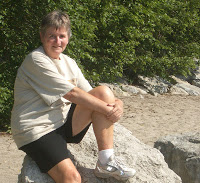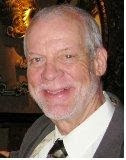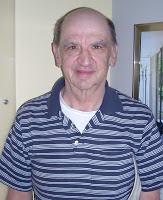Dancing with the Stars, by Ray S
Hope, by Gillian
In my early days of working for IBM, on the bottom rung of the jobs ladder, I had a sign hanging by my workstation. It read,
I FEEL MUCH BETTER NOW THAT
I’VE COMPLETELY GIVEN UP HOPE.
I don’t know why I found this so amusing, but I did. Of course, as soon as I advanced to the next rung of the ladder I had to trash it, but I and my co-workers enjoyed it at the time – indeed it became quite a catch phrase for a while.
Perhaps it seemed funny at the time because I was, then, so far from giving up hope. I was full of hope and dreams. It was 1966; the midst of the swinging sixties with their promise of change and freedom. I was twenty-four and had a job which paid more than I had ever dreamed of making – eighty-four dollars a week. My future was awash with wonders! I was not to be disappointed. My life became awash with wonders, as it still is.
But the words from that silly little sign have never left my head. They pop up from time to time. There are certain circumstances when I find them to be true. Hope is not always your best friend; certainly not when it morphs into denial. On one visit to England to see my parents, I noticed a certain confusion of thinking in my dad. Oh well! I shrugged it off. He was, after all, in his seventies. It was only to be expected. (He was, of course, the age I am now – something else I would rather not think too much about.) Filled with false hope I returned to Colorado, only to be summoned back across the Pond after a few months, to deal with the reality of Dad’s dementia, which had worsened rapidly. My mother and I were both forced to abandon our hopes that he could remain at home and I set about learning my way through the bureaucracy of the British National Health Care System. I felt much better then, having abandoned all hope. Dad ended up in a facility for those with dementia in what was once the work-house in a local town. It was a very grim-looking building, but inside they had done everything possible to make it bright and cheerful, and the staff was wonderful. And it was free. I don’t think Alzheimer existed back then, and we didn’t have the knowledge of dementia which, sadly, we do now, but I knew enough to know there was no hope; that he would only get worse. The next, and last, time I saw him, he had no idea who I was. That was hard, but nothing like the shock it would have been had I been harboring false hopes.
One of my stepsons suddenly developed juvenile diabetes when he was eleven years old. Out of the blue, no more Xmas cookies, no birthday cake, no more of most of the food he loved. On top of that came the prospect of having to give himself an insulin injection every day of the rest of his life, and having constantly to measure and adjust his sugar levels. He cried. He raged. He threw things. He punched out at any of us who tried to hold him. Then suddenly, after a few crazy days, everything changed. He had given up hope and accepted his new reality. Of course he was not happy about it, but he had stopped fighting it. He is now retired from a lifetime at the post office, living happily in Nevada with his wife and large extended family. He told me once that the only time his diabetes really upset him was on a few occasions when he heard of the possibility of some big medical breakthrough, and felt a surge of new hope only to have it dashed. He had learned that hope was better avoided.
I have known people, and heard of many more, who, on receiving the terrible diagnosis of a terminal illness, were able to be at peace with it once they truly accepted that there was no hope. That is really living in the now, as our spiritual teachers would have us do. Hope is one of many things which prevent our doing that. We can never be fully in the present moment if we are forever dwelling in hopes and dreams of some future moment.
On the other hand, hopes and dreams of that better future can help those who see nothing to be grateful for in their ugly now. We recently watched a TV program, doubtless on PBS, about children growing up in poverty in this country. It was striking how many teenage boys found an incentive to stay in school, and more than that, to do well in their studies, because they hoped to get a football scholarship to college and go from there to professional football. It offered them at least a hope of a way out. What happens when they find they are not to belong to that tiny percentage of footballers, I don’t know. Has hope set them up for a mighty fall, or have they by virtue of that very hope, found some other way out?
What the Tangerine Tyrant did to his voters is nothing short of cruel. (See, I just cannot get through one story without him creeping into it!) He gave gullible people hope; but false hope.
By now most of theirs must be crashing down. Where are the re-opened mines and factories they were promised? Where is the nice clean swamp? And now, certainly, what has happened to that tax break? Oh, it suddenly became a tax increase. And they are about to lose their healthcare. No, he has taken away what hope they had and left them much worse than they were before.
You just have to get your mind off all this stuff, so thank goodness for football season! I don’t care that the Broncos are having the worst season in over fifty years. At least they know how to do it right. They are not only bad, they are spectacularly bad. Every week they fail to disappoint.
Yesterday they managed to have not one but two safeties scored against them. No team has done that since 1961. I mean, how good is that at being bad? Very clearly, they will not turn this season around.
I FEEL MUCH BETTER NOW THAT
I’VE COMPLETELY GIVEN UP HOPE.
© December 2017
About the Author
I was born and raised in England. After graduation from college there, I moved to the U.S. and, having discovered Colorado, never left. I have lived in the Denver-Boulder area since 1965, working for 30 years at IBM. I married, raised four stepchildren, then got divorced after finally, in my forties, accepting myself as a lesbian. I have been with my wonderful partner Betsy for thirty years. We have been married since 2013.
Tears, by Pat Gourley
More often than not these days when trying to write something for this group I am stumped with little coming to mind. Perhaps in part this is due to my having exhausted my “story”. And to be sure these days at my age I find myself doing many fewer things that might be worthy of repeating to anyone.
However, with this topic as I have pondered it over the past week I am struck with how many things actually do come to mind to write about. This may be related to the fact that through cable news, the Internet and social media in particular all manner of bad crap from the world over is continually barraging us and much of it is tear inducing.
I am a believer though that we live in the best of times and the worst of times. Not falling for a false romanticizing of ages gone by I do believe that for most of Earth’s people things were much worse in the not so distant past. Much work of course remains to be done however. I hope for worldwide Democratic Socialism and the death of Capitalism. That will require great effort, much more than just a Resist t-shirt, the occasional demonstration or a bumper sticker. To quote Oscar Wilde on the difficulty of the individual effort involved in creating change: “Socialism is great but it takes up too many evenings”.
Thinking about my own tears I am aware that it seems much easier for me to cry these days than it did several decades ago. For me the years 1985-1995 in particular were filled with so much death and suffering that perhaps I had become numb and immune to it and stopped being able to muster any tears. The death of my partner David in 1995 from AIDS related issues did however break the dam open and the tears began to flow again. Are the most genuine tears always personal?
Now it seems I can cry around a whole variety of issues. Things I see on TV often trigger tears. Rescues of abandoned pets or animal shelter adoptions that go well that are dutifully recorded on video and most often posted to Facebook prompt the waterworks.
Seeing people return to their burned out homes in California is particularly tear inducing. Also footage of refugees in boats is almost always a trigger for tears. The cholera epidemic in Yemen fueled in no small part by U.S. support of the Saudi inflicted violence raining down on that country is a very sad case in point and speaks directly to King’s statement above.
I was though most recently brought to tears reading a piece by Glenn Greenwald he had posted to the Intercept (the intercept.com): https://theintercept.com/2017/10/05/factory-farms-fbi-missing-piglets-animal-rights-glenn-greenwald/
It is a multilayered and long story that is a very difficult read because of the content and the numerous photos of pigs being horribly abused in a factory farm in Utah. It is the story of two rescued piglets named Lilly and Lizzie and the draconian measures carried out by the FBI at the behest I assume of the factory farm in Utah that breeds and slaughters over a million pigs a year.
The piglets were rescued by an animal rights group called Direct Action Everywhere: https://www.directactioneverywhere.com
The FBI was enlisted to track down the piglets since animal rights activists on occasion have been designated as terrorists and numerous states now have AG-GAG laws which criminalize whistleblowers photographing and exposing the horrors of America’s factory farms. Good news on this front is that Utah’s AG-GAG law was recently ruled unconstitutional based on the First Amendment by a Federal judge. Stay tuned however since the First Amendment is under attack from many corners these days, very possibly including the Supreme Court.
So your tax dollars were at work when a caravan of FBI agents accompanying a veterinarian descended on an animal sanctuary in Erie Colorado to collect DNA samples from the suspected escapees Lilly and Lizzie even though the sanctuary itself had nothing to do with the piglets’ liberation. As of this writing Lilly and Lizzie are thought to be safe and both have recovered nicely from their horrific beginnings.
So for me I guess my tears are often painful but cathartic. But is crying about anything ever enough?
I don’t want to end on a preachy note but oh well what the hell. Addressing the carnage in Yemen will require many necessary evenings of activism, sorry Oscar, but helping Lilly and Lizzie and their millions of kin is much easier: just quit putting so much animal product in your mouth.
© October 2017
About the Author
I was born in La Porte, Indiana in 1949, raised on a farm and schooled by Holy Cross nuns. The bulk of my adult life, some 40 plus years, was spent in Denver, Colorado as a nurse, gardener and gay/AIDS activist. I have currently returned to Denver after an extended sabbatical in San Francisco, California.
Empathy, by Gillian
Hmm … tricky. But so wonderful. Empathy eliminates hate, resentment, envy, in fact most negative emotions you can name. It replaces them with peace for the soul. But it’s not easy.
Perhaps some people are just naturally given easier access to it than others, but I believe we can all improve our capacity for empathy no matter the starting point.
Empathy requires the ability to see through another’s eyes, to feel what they feel and to stand in their shoes. For me, that requires some commonality with that person. In general I find a more intuitive empathy with a woman, for instance, than with a man. I frequently am able to find that empathy with men but it requires more work; more of a thought process to get me there. I easily empathize with the poor and dispossessed. I know, as many of us do, that my good life has come to me purely by chance. We look at the sad people on the street corner and say, there but for the grace of God go I. Most people can feel empathy with a child; we have all been one. All of us in this room, by our age, find easy empathy with grief. We have all felt it. Surely the entire LGBT community feels a kind of collective empathy, it’s one of the reasons we like to be together. We don’t have to explain ourselves to each other.
There is a great deal of talk of sexual harassment/abuse in the last couple of weeks. I immediately empathize with the woman, but have a struggle with the man. I can honestly say that I have never ever grabbed at or fondled any man or woman in any way inappropriately. Nor have I ever had any urge to do so. But if I think as honestly as I truly can about the lesser varieties of what we now term sexual harassment, I begin to see it through the man’s eyes. Men of our generation have lived in confusing times. I honestly think that most, certainly many, who acted incorrectly, really believed that women wanted what men wanted. We had to put up some token objection because our mothers said we should, but we didn’t really mean it; that old no really means yes syndrome. All too frequently, our protests did perhaps lack conviction. We were in a quandary. If we came on too strong with an ego-deflating rejection then the man, almost inevitably in a position of power over us, might take revenge. We would lose our job, or fail to get that deserved promotion or starring role. Or the man held some respected position in the community: priest, schoolteacher, doctor, lawyer, who would believe us if we spoke out? So we kept quiet. Other women were bribed into silence, leaving others open to the same abuse. Not that I blame the women who got bought off. Oh no, empathy with them comes easy. Which would you choose? Door #1, behind which lies nothing but screaming tabloid headlines and endless character assassinations, or door #2 which opens onto an easy life with everything that twenty million dollars can buy? No contest. And so, sadly, in different ways, we women were complicit in our own demise while men, lacking much evidence to the contrary, convinced themselves that we really did want what they wanted.
Don’t get me wrong, I am talking here of the relatively benign offenses causing perhaps more discomfort and embarrassment than true trauma. Anything remotely approaching physical violence, rape, or pedophilia lies way way beyond the scope of my empathy. Which leads inevitable to that incredibly revolting excuse for a human being, Judge Moore of Alabama, who lies somewhere in the outer reaches of darkness millions of light years away from that little flash of illumination coming from any feelings of empathy from me. He is triply out of reach to me because not only is his behavior reprehensible, but he continues to deny it, and then wraps it all up in the cloak of religion and The Bible. I make no attempt to see what he sees; it would be of nightmare ugliness.
Those who support him are every bit as bad; possibly worse. The Alabama State Auditor, for example, sees nothing wrong with Moore making sexual advances to a fourteen year-old.
“There’s just nothing immoral or illegal here…,” Ziegler stated. “… Mary was a teenager and Joseph was an adult carpenter. They became parents of Jesus.”
Hello-o out there! Did he miss the memo about The Immaculate Conception and The Virgin Birth?? Honestly, all you can do is shake your head in amazement. To raise one spark of empathy for these people I would need to think about it all for a very long time, and I have no stomach for that.
Every week when I start writing, I swear to myself that I will stay away from any mention of Trump, but somehow Agent Orange manages to insert himself. I have no empathy for Trump because I am not a sociopath, so cannot begin to stand in his shoes. But because he is, I truly believe, a sick man, I do not hate him either. Though when he so smugly promises us that ”big beautiful tax cut” for Xmas while in truth planning to raise our taxes and destroy our healthcare, I think just maybe I could.
Alas, empathy, like so many things, is a double-edged sword. The Orange Ogre (did I say I did not hate him??) stood in the shoes of a section of the country’s voters and saw what they saw. He felt their anger, resentment, and fear, and built it up to the fever pitch of “lock her up”. It was his very empathy with them, which he used with great cunning, which won him the election. (Though not without a little help from Putin and a shove over the line by the Electoral College.)
With the Trump voters, my empathy goes about half the distance to the goal. (Excuse the expression but we are in the midst of football season!) I can see the world through their eyes. I can feel their fear and anger and disillusion over a future of ongoing white male supremacy which they once felt was promised and which now seems to have been taken away. But I cannot accompany them into the divisiveness, bigotry, and hatred which accompanies their fears.
Since last year’s election our country seems to be enveloped in a stinking dark miasma of Trumpian vitriol. Yet I, ever the political pessimist, do feel some hope. And it comes to me via empathy. We call it Resistance, but what engenders that but empathy? Sure, we all have our own personal fears which propel us to resist the horrors of the Trump agenda, but the vast majority of American people demonstrate great empathy. We feel the terror of refugees denied sanctuary, the despair of deportees and their destroyed families, the terrible fears felt by the families of the nine million children who will lose the healthcare provided under the C.H.I.P. program unless Congress acts before year-end. We see through the eyes of those abandoned in the devastation that is Puerto Rico, and the 60,000 Haitians who learn they must abandon their lives in this country and return to Haiti.
We empathize. We get it. We resist. If Robert Mueller doesn’t save us, maybe our own empathy will. The bright light of empathetic resistance will dispel the threatening clouds of darkness. Maybe. Maybe that is our best hope. Maybe that is our last best hope. But then, I’m a political pessimist.
About the Author
I was born and raised in England. After graduation from college there, I moved to the U.S. and, having discovered Colorado, never left. I have lived in the Denver-Boulder area since 1965, working for 30 years at IBM. I married, raised four stepchildren, then got divorced after finally, in my forties, accepting myself as a lesbian. I have been with my wonderful partner Betsy for thirty years. We have been married since 2013.
School, by Pat Gourley
stared in 1955 when I was a first grader at St. Peter Catholic School in La Porte
Indiana. My family lived on what was actually a real family farm of about 200
acres growing corn, soybeans, wheat and oats. We had a few milk cows, the
occasional pig, a few sheep and lots of chickens along with a dog or two and
several barnyard cats. The cats had escaped the fate of so many other barnyard felines
and not wound up in a gunnysack full of rocks at the bottom of a horse tank.
What can I say it was a different time and this cat population control was
usually done out of sight from us kids.
the farm to the town of La Porte that had three elementary Catholic schools. We
went to the one that served mostly Irish families.
maternal and paternal were not far removed from Ireland and on my mother’s side
supposedly came from Roscommon County. I believe these grandparents were all
second-generation immigrants from the Emerald Isle, but unfortunately I do not
know this for sure. I should check this out though since if just one of your
grandparents was born in Ireland, even if neither parent was, you are eligible
for Irish citizenship. This is something
that seems quite attractive these days.
northern Indiana for sometime but being Irish Catholics they had not always
been welcomed with open arms. Family lore included an oft repeated story of a
KKK cross burning at the end of the lane leading to my paternal grandparent’s
home in the early 1920’s. The Klan was very resurgent at that time and Indiana
was a hotbed of this activity. Along with African Americans the Jews and
Catholics were also on their list of undesirables.
being quite cocooned in the environment of conservative Catholicism 24/7 we
were fairly sheltered from these blatant forms of racism and xenophobia. I mean
we were after all white living in the very white world of rural Indiana and the
KKK was on the wane by this time. The unrelenting religious brainwashing I was
subjected to in grades 1-8 was in hindsight a form of child abuse no matter how
righteous or well intentioned. Sadly generations had been drinking that religious
kool-aide. My parents, at significant financial cost for a lower middle class
family, felt the burden of parochial school for their kids was an act of love,
a duty even and therefore something necessary. It was after all a bunch of
Protestants who had burned that cross at the family farm several decades
before.
through my grade school years the rumblings of great social change were on the
horizon. For my family this was manifest in the fact that an Irish Catholic was
running for president and the ground truly began to shift when he was actually elected
president of the United States. It was a true miracle, JFK in the White House.
Even his assassination a few short years later could not slow the train of
change.
significant sacrifice on my parents’ part I was enrolled in a Catholic high
school in Michigan City Indiana in 1963 called St. Mary. This was a time when
my queer juices were really taking off though the environment of a Catholic
School in northern Indiana was not conducive to supporting this gay
flowering. Then an amazing thing
happened late in my sophomore year and my family moved to a small farm outside
of Woodstock Illinois, a town best described as a suburban bedroom community
northwest of Chicago.
I believe today to be my two most important school years. Nothing like coming under the influence of a
very politically left-leaning, staunchly anti-war Holy Cross nun and seeking
guidance to deal with my ever emerging gayness from a school counselor several
decades older than myself who was to become my first sexual partner. These two
mentors did more to shape who I am today than all the many other teachers I
encountered over my long and often tortuous formal educational path.
about these two individuals for this group and won’t reiterate those details
here. Suffice it to say though that my formal schooling continued for years to
come. Those academic adventures included 5 years at the University Of Illinois
at Champaign-Urbana, two years of nursing school at the University of Colorado
and another two years at Regis University here in Denver where I was awarded a
Masters Degree in Nursing Administration. That last one was truly a
masturbatory exercise in how to waste time and money for which I take total
responsibility, the faculty at Regis tried, and they really did.
least 21 years of formal education. There are really only two years of that
that mattered and those were 1966 and 1967 when I learned the joys of gay sex
and how to challenge the status quo. The knowledge of gay sex has served me
well, despite the little HIV issue. The importance of being a sexual adept though
seems to fade with each passing year but the ability to hit the streets and man
the barricades continues to be more salient than ever. As an often seen resistence
sign says these days “I can’t believe I
still have to protest this shit”
the Author
on a farm and schooled by Holy Cross nuns. The bulk of my adult life, some 40
plus years, was spent in Denver, Colorado as a nurse, gardener and gay/AIDS
activist. I have currently
returned to Denver after an extended sabbatical in San Francisco, California.
Purple Rage, by Lewis Thompson
encyclopedic new book, Why the Right Went Wrong: Conservatism from Goldwater to the Tea Party
and Beyond, E. J. Dionne, Jr., spells out in exhaustive detail how the
Grand Ol’ Party evolved from the Middle American conservatism of Dwight David
Eisenhower to the rabid, ranting, rage of Donald Trumps’ avid band of Storm
Troopers. In a nutshell, it happened
when the bedrock conservative vision of Barry Goldwater–which had given rise
to the hopes of millions of conservative, white working-class people that their
superior status among the races was assured—sustained set-back after set-back
politically in the decades to follow.
lose in a landslide resulting in the election of LBJ who ushered in the Voting
Rights Act but the next Republican president, Richard M. Nixon turned out to be
a stealth liberal whose term ended in utter shame and embarrassment. In his
1978 memoir, RN, Nixon wrote, “I won a majority of every key population
group identified by Gallup except the blacks and the Democrats. Four of those groups—manual workers,
Catholics, members of labor union families and people with only grade school
educations—had never before been in the Republican camp in all the years since
Gallup had begun keeping these records.”
[Why the Right Went Wrong, p.74.]
planned to give expression to the more conservative values and beliefs of the
New Majority throughout the country….I intended to revitalize the Republican
Party along New Majority lines.” [ibid.]
Southern Democrats to the GOP had been going on since LBJ’s hay-day as
president. But it was Ronald Reagan’s failed
1976 campaign, whereby he “rais[ed] a banner of no pale pastels but bold colors
which make it unmistakenly clear where we stand” that launched the “Reagan
Revolution” toward which the Party stills displays undying fealty. It was a banner that Gerald Ford hastened to
pick up, as has every GOP president since, though George H. W. Bush dropped it
more than once.
who liked to call himself a “compassionate conservative”, further frustrated
those who considered themselves to be “true conservatives”. His bumbling engagement in two costly wars in
southern Asia and the Middle East further alienated his conservative base and
the Great Recession which closed out his term in office left many of them in a
sad way economically.
combined with the ascension of a black man to the Presidency, is what led to
the level of vitriol we now see on the faces of the men and women who comprise
a typical Donald Trump mob today. They
are the new base of the GOP. They come
from “red states” as well as “blue states”.
(Thus my title for this piece, Purple
Rage.) They see change not as
something they can believe in but as something to fear. It is not stalemate in Washington that they
lament but an arc of history that for them is bending toward the Left. For almost 50 years, they have witnessed one
frustration after another coming out of Washington. The only bright light for them is Ronald
Reagan. He made this country, in their
eyes, “great”.
Donald, promising to make America great again.
He is unlike any politician they have ever known—brash, tough, taking no
crap. He is rich, he is powerful and
he’s bold. Perhaps they haven’t noticed
that his posture on stage, his swagger, suggests no one–as someone on the Bill
Maher Show last Friday pointed out—so much as “Il Duce” himself, Benito
Mussolini. I like to think of him as
“Donito Trumponi”.
the situation in the United States today is to that of Eastern and Southern
Europe in the days following World War I and the Great Depression. But I do believe that the kind of change the
world has undergone over the past 60 years can produce a great deal of fear—and
the concomitant anger—in those whose core values appear to be steadily eroding. I have seen their faces in the crowds
surrounding Mr. Trump and it frightens me.
I am frightened even though I have made the attempt to understand from
where they are coming. But when I think
of what lies in store for America and the rest of the world should Mr. Trump
become the most powerful man in that world, my knees start to rattle. It is not too late to interrupt this
eventuality. I still believe that there
are more Americans who welcome progress toward a better life for all than
resent it. But those of us of that mind
must follow through on what we know is the only peaceful means available to
interrupt that darker vision and that is to vote for the side that still
believes that justice for all and animosity for none is the better way.
Here’s a quote that I just ran across.
The source is unknown:
accustomed to privilege, equality feels like oppression.”
the Author
beautiful state of Colorado out of my native Kansas by way of Michigan, the
state where I married and had two children while working as an engineer for the
Ford Motor Company. I was married to a wonderful woman for 26 happy years and suddenly
realized that life was passing me by. I figured that I should make a change, as
our offspring were basically on their own and I wasn’t getting any younger.
Luckily, a very attractive and personable man just happened to be crossing my
path at that time, so the change-over was both fortuitous and smooth.
retired and we moved to Denver, my husband’s home town. He passed away after 13
blissful years together in October of 2012. I am left to find a new path to
fulfillment. One possibility is through writing. Thank goodness, the SAGE
Creative Writing Group was there to light the way.
Ne Me Ouitte Pas / Don’t Leave Me, by Gillian
has been recorded by many famous singers, but I first became aware of it with
the Neil Diamond* release in 1971.
It’s a sad song but I always liked it well enough, singing along with it on the
radio. I also had it on a Neil Diamond album on cassette.
well
………..
is simply if you go away repeated four times.
many of you are familiar with the song.
thought a whole lot about the lyrics until, several years later, I stumbled
upon the original version. In French, it was written in 1959 by Belgian
singer/songwriter Jacques Brel. Like it’s English counterpart, it has been
recorded by many artists in many languages: 24 to be precise. The English
adaptation was done by Rod McKuen and, sadly, to me, is a mere hint of the
beauty and power of the original French.
when I began actually listening to the English lyrics of If You Go Away.
That phrase is undeniably poignant, but repeating it in sets of three several
times, in retrospect, seems a slight overkill. My life is going to be turned
upside down if you go away …… if you go away …… OK, I get
it. Somehow there seemed something slightly irritating about that conditional;
that if. It made me feel like grabbing him by the shoulders and shaking
him. Alright already! Apparently, it’s not yet a done deal so stop whimpering
in the corner and get up and fight! Do something about it!
middle passage of the song which turns hopeful.
………..
really? Is that it? If I stay with you, I get one wonderful day. That’s it? No
more? Business as usual? Hardly a compelling argument. If I’m dying, if that’s why
I might go away, perhaps the offer might inspire me to the strength to hang on
just one more day. But to be realistic, it’s hardly likely to be the wonderful
one on offer, and even if it were I probably could not delay my leaving for
more than just one day.
English lyrics do not stand up to too much examination.
French. Oh, the original French. What power. What tragedy. What pathos. We lost
everything when we translated the simple, ever-powerful, ne me quitte pas,
don’t leave me, into the somewhat insipid if you go away. (Of
course, I should not even use the word translate. If I had translated don’t
leave me into if you go away in my high school French exams, I’d
have flunked for sure. Poetic license can be a dangerous thing.)
easy to find an English translation of the original lyrics of Ne Me Quitte
Pas, as opposed to our English adaptation from the ’60’s. In the early
’80’s when I first discovered the original French version, my command of the
language was insufficient for me to gain more than a loose understanding of
most of the meaning. Now I know that the original, for instance of I’ll make
you a day etc, was –
……….
more imaginative. But what did it matter? All you really need is that
gut-wrenching repeated phrase: ne me quitte pas, ne me quitte pas, don’t
leave me, don’t leave me.
version** is by the inimitable Nina Simone,
American singer, songwriter, and political activist. Her throaty, almost
tear-filled, voice, is almost enough to make me cry without benefit of words.
The song haunts me. It leaps into my head each time one more friend or loved
one leaves this earth, which sadly happens more frequently as we age.
with French, it is a cri de coeur, a cry from the heart.
sung in almost a whisper, it is a howl from the depth of the soul.
despair.
pas.
raised in England. After graduation from college there, I moved to the U.S.
and, having discovered Colorado, never left. I have lived in the Denver-Boulder
area since 1965, working for 30-years at IBM. I married, raised four
stepchildren, then got divorced after finally, in my forties, accepting myself
as a lesbian. I have been with my wonderful partner Betsy for thirty-years.
We have been married since 2013.
Finding Your Voice, by Louis Brown
I Don’t Know, by Phillip Hoyle
time writing, painting, and socializing. In general, he keeps busy with groups
of writers and artists. Following thirty-two years in church work and fifteen
in a therapeutic massage practice, he now focuses on creating beauty. He
volunteers at The Center leading the SAGE program “Telling Your Story.”









